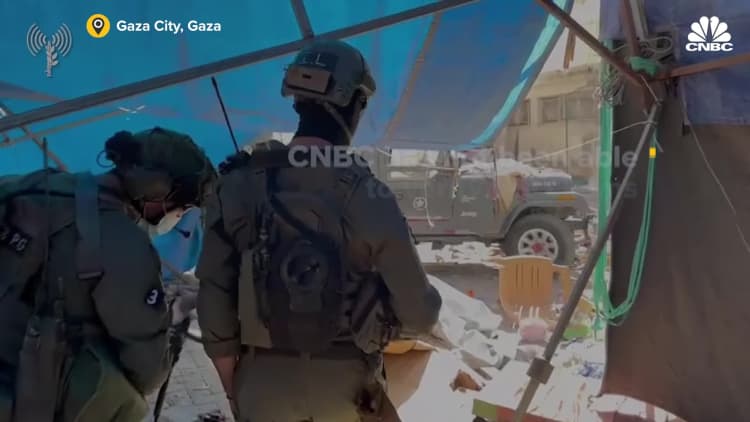[ad_1]
An International Committee of the Red Cross (ICRC) convoy of trucks carrying medical aid arrives at the Al-Shifa medical hospital in Gaza City, Gaza, on Tuesday, Nov. 7, 2023.
Ahmad Salem | Bloomberg | Getty Images
DEIR AL-BALAH, Gaza Strip (AP) — The United Nations was forced Friday to stop deliveries of food and other necessities to Gaza and warned of the growing risk of widespread starvation after internet and telephone services collapsed in the besieged enclave because of lack of fuel.
Israel announced that it will allow two tanker trucks of fuel into Gaza each day for the U.N. and communication systems. That amount is half of what the U.N. said it needs for lifesaving functions for hundreds of thousands of people in Gaza, including powering water systems, hospitals, bakeries and the trucks delivering aid.
Israel has barred entry of fuel since the start of the war, saying it would be diverted by Hamas for military means. It has also blocked food, water and other supplies except for a trickle of aid from Egypt that aid workers say falls far short of what’s needed.
The communications blackout largely cut off Gaza’s 2.3 million people from one another and the outside world.
The U.N. agency for Palestinian refugees, known as UNRWA, couldn’t bring in its aid convoy Friday because of the communications cutoff, spokesperson Juliette Touma said.
“An extended blackout means an extended suspension of our humanitarian operations in the Gaza Strip,” Touma told The Associated Press.
Phone and internet services in parts of the Gaza Strip were partially restored Friday night after a limited quantity of fuel for generators was provided, according to NetBlocks, a group that tracks internet outages.
Israeli forces have signaled they could expand their offensive toward Gaza’s south while continuing operations in the north. Troops have been searching the territory’s biggest hospital, Shifa, for traces of a Hamas command center Israel alleges was located under the building — a claim Hamas and the hospital staff deny.

On Friday, the military said it found the body of another hostage, Cpl. Noa Marciano, in a building adjacent to Shifa, like that of another hostage found Thursday, Yehudit Weiss. Hundreds of mourners, many carrying Israeli flags, attended Marciano’s funeral Friday in her hometown of Modi’in.
The war, now in its sixth week, was triggered by Hamas’ Oct. 7 attack in southern Israel, in which the militants killed more than 1,200 people, mostly civilians, and abducted some 240 men, women and children.
More than 11,400 Palestinians have been killed in the war, two-thirds of them women and minors, according to Palestinian health authorities. Another 2,700 have been reported missing, believed buried under rubble. The count does not differentiate between civilians and militants, and Israel says it has killed thousands of militants.
Aid dries up
After an American request, Israel agreed to let a “very minimal” amount of fuel into Gaza each day, national security adviser Tzachi Hanegbi said. COGAT, the Israeli military body responsible for Palestinian affairs, said it would amount to 60,000 liters (15,850 gallons) a day for the U.N.
For the communications network, Israel also agreed on another 10,000 liters a day (2,640 gallons), a U.S. State Department official said.
UNRWA and other humanitarian groups need at least 120,000 liters (31,700 gallons) a day to run lifesaving functions, Touma said.
Gaza has received only 10% of its required food supplies each day in shipments from Egypt, according to the U.N., and the water system shutdown has left most of the population drinking contaminated water, causing an outbreak of disease.
Dehydration and malnutrition are growing, with nearly all residents in need of food, said Abeer Etefa, a Mideast regional spokeswoman for the U.N.’s World Food Program.
“People are facing the immediate possibility of starvation,” she said Thursday from Cairo.
[ad_2]
